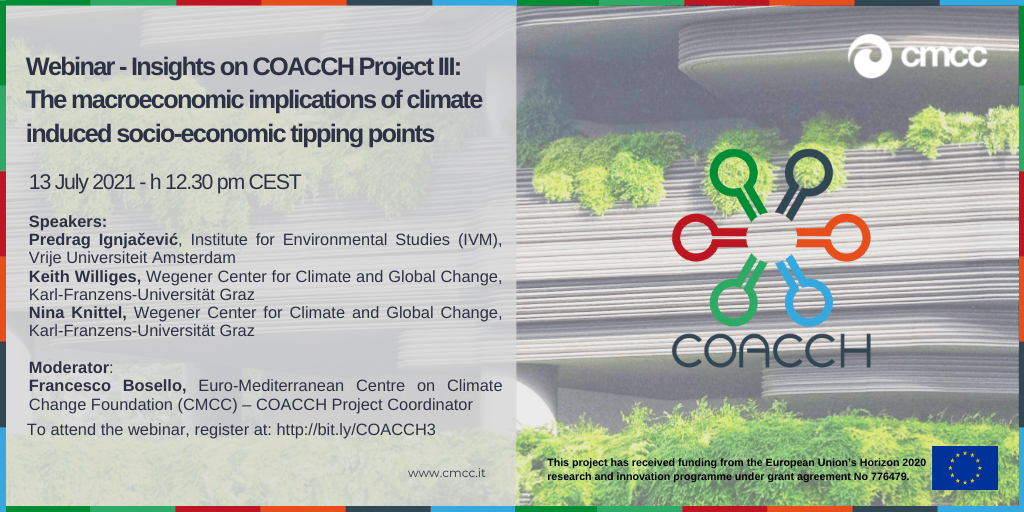Insights on COACCH Project III
July 13, 2021 – h. 12:30 pm CEST
Speakers:
Predrag Ignjačević, Institute for Environmental Studies (IVM), Vrije Universiteit Amsterdam
Keith Williges, Wegener Center for Climate and Global Change, Karl-Franzens-Universität Graz
Nina Knittel, Wegener Center for Climate and Global Change, Karl-Franzens-Universität Graz
Moderator:
Francesco Bosello, Euro-Mediterranean Centre on Climate Change Foundation (CMCC) – COACCH Project Coordinator
Abstract
The concept of tipping-points in climate forecasting has received much attention over recent years. Well-known examples of these are levels of greenhouse gas concentrations and global warming where the melting of Arctic sea ice, the thawing of permafrost, or the changing Atlantic circulation becomes irreversible. A reasonably novel academic concept is a tipping-point in the socio-economic sphere, where a similar external shock may cause a socio-economic system to fundamentally change. Examples of this can be found in agriculture, where desertification may at a certain point cause land abandonment, or winter-tourism, where low-lying ski-resorts may become unprofitable due to global warming. Within the COACCH project, several such climate induced socio-economic tipping points were investigated for the EU, including the collapse of flood insurance markets due to extreme weather risks, climate induced economic shocks, and electricity system failures due to increasing occurrences of wildfires. Following the analyses of the potential occurrence and impact of these tipping-points, their respective indirect economic impacts are assessed. For example, a collapse of insurance markets for natural hazards may require governments to provide disaster aid, or individuals to use private savings to finance reconstruction after a disaster, both of which have further indirect economic impacts. Climate induced economic shocks such as large sudden losses due to extreme weather, which are measured using a novel metric called time of emergence of economic impacts (ToEI), cause changes in production factors and consumer behavior, especially when these shocks are persistent. Electricity system failures due to wildfires have significant indirect economic impacts on production, as an electricity supply failure may completely cease production in many firms. In the upcoming webinar Nina Knittel, Predrag Ignjačević, and Keith Williges will present the results of their research on these topics respectively.
Watch the video:
HOW TO PARTICIPATE
The webinar will be broadcasted via Zoom.
Please, click on the following link for registration:
https://us02web.zoom.us/webinar/register/WN_0hzJCfK_TkmyTT8m6ldgoA
After registering, you will receive a confirmation email containing information about joining the webinar.
ORGANIZED BY
- Fondazione CMCC – Centro Euro-mediterraneo sui Cambiamenti Climatici
- COACCH Project
This project has received funding from the European Union’s Horizon 2020 research and innovation programme under grant agreement No 776479


